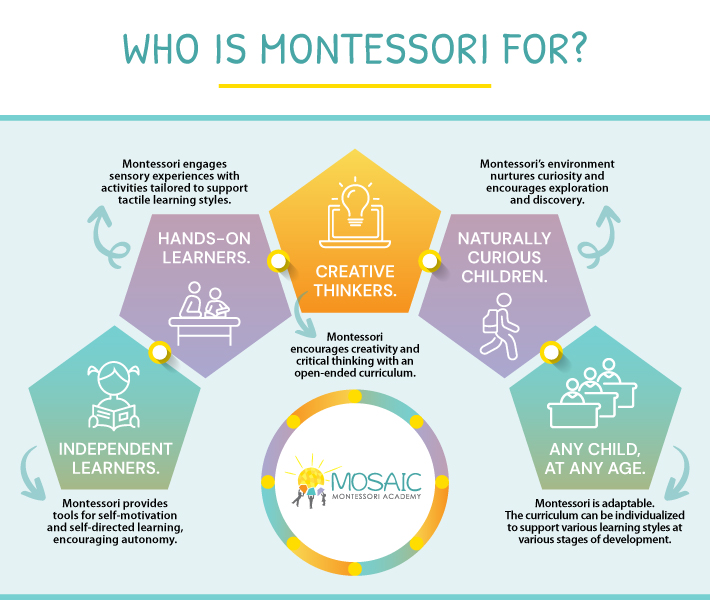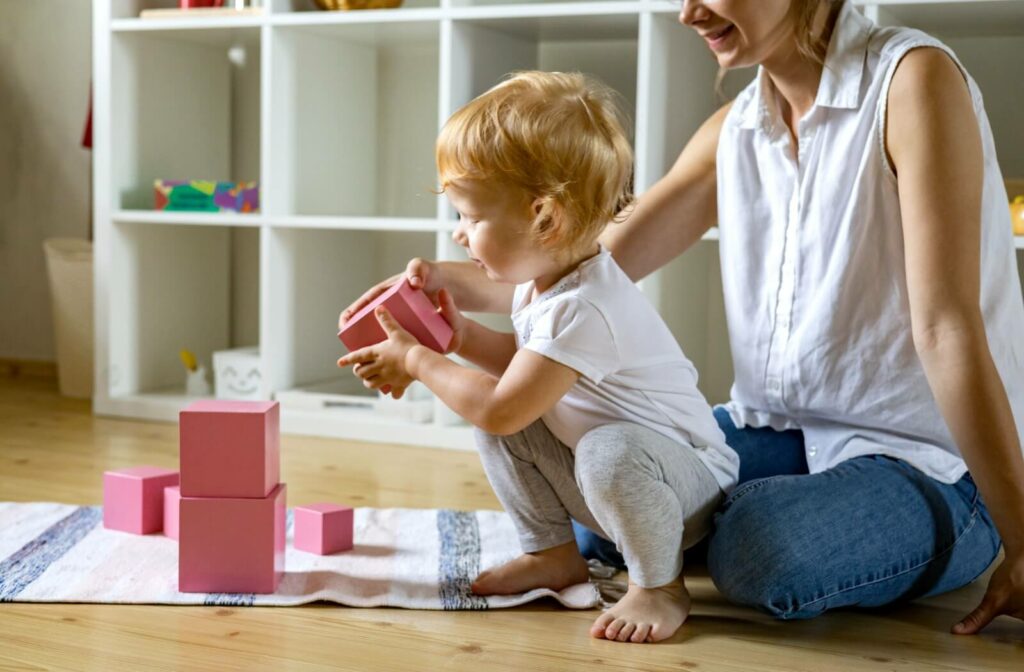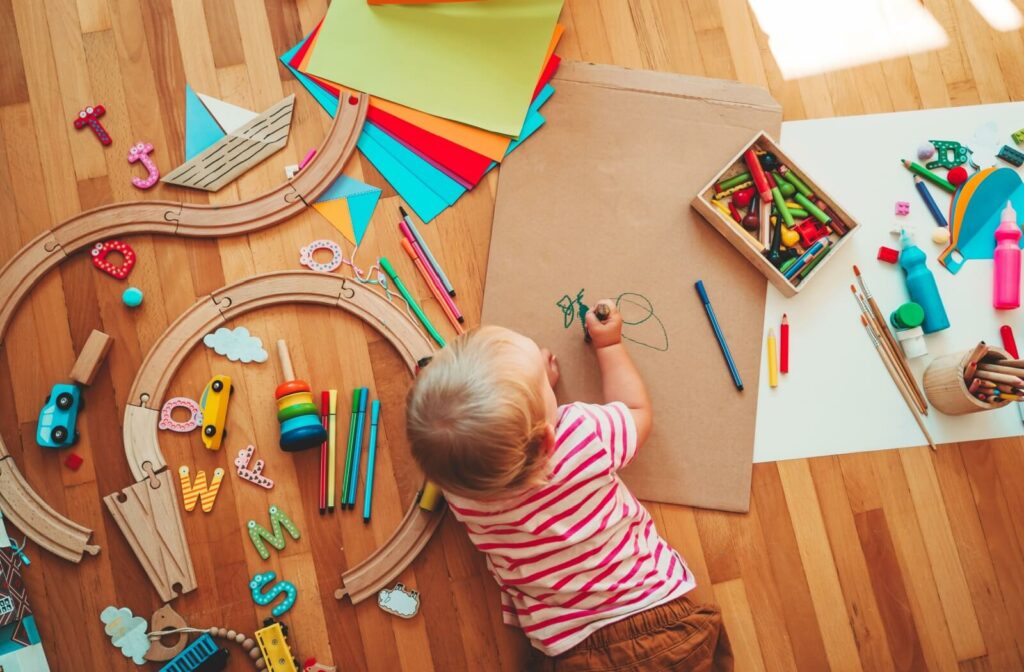At the heart of Montessori education is the belief in nurturing a child’s innate desire to learn. It encourages exploration and discovery, emphasizing the importance of practical life skills and executive functioning skills.
Especially when started early in childhood, Montessori can be good for any child but will be exceptionally beneficial for naturally curious, creative, and independent children.
What Is the Montessori Method of Teaching?
The Montessori Method, developed by Dr. Maria Montessori, is a child-centred method of education that encourages children to lead activities with teachers as guides.
Dr. Montessori’s approach to education capitalizes on children’s planes of development:
- Children ages 0–6 have incredibly absorbent minds, sensitive to sensory information. They learn by interacting with their environment.
- At ages 6–12, children complete the initial development of their personality. With an understanding of the world around them, they develop their senses of empathy, compassion, relatability, morals, and ethics.
- At ages 12–18, children undergo significant psychological development. Students gain a solid sense of dignity, respectfulness, and belonging.
- At ages 18 and above, students continually gain an understanding of culture, society, and people.
Based on these planes of development, the Montessori environment nurtures independence, creativity, self-regulation, critical thinking, and problem-solving. The curriculum is designed to help students succeed both academically and socially.
Most importantly, Montessori education helps foster a lifelong love of learning.
Why Is Montessori School Different?
Montessori schools emphasize self-directed activity, hands-on learning, and collaborative play to distinguish themselves from traditional educational settings.
Montessori classrooms develop individualized learning paths for each student to support and develop their individual aptitudes. Other notable characteristics of Montessori schools include:
- Child-Centered Education
- Montessori-Trained Teachers
- Adaptable Curriculum
- Multi-Age Classrooms
- Hands-On Montessori Materials
The Montessori learning environment is practical and experiential. It encourages critical thinking and problem-solving while emphasizing independence and freedom.
While each age range has distinct learning objectives based on the planes of development, Montessori education simply guides students toward those objectives. Unlike traditional schools, Montessori education allows students to choose many tasks and learn at their own pace. This helps foster self-discipline and self-motivation, sparking each child’s natural curiosity.
How Do I Know if Montessori Is Right for My Child?
The Montessori classroom can work for any child and accommodate various personalities and learning styles. Montessori materials allow visual, auditory, tactile, and verbal learning. Experience is key in these classrooms—children who learn by observing and children who learn by doing can both benefit.
While this type of learning can be “right” for any child, it can be especially beneficial for children who are naturally inclined to the self-regulating environment of the Montessori classroom.
Independent Learners
Children who exhibit a desire for autonomy are often attracted to Montessori settings. The structure of these classrooms allows children to choose their activities and learn at their own pace, giving them the tools they need to seek out knowledge.
The focus on independence helps nurture self-motivation and fosters a love for exploration and discovery, making it ideal for those who enjoy exploring their interests without rigid direction.
Hands-On Learners
Montessori education emphasizes experiential and practical learning through tactile and hands-on activities. Children who learn best through doing often find the Montessori environment particularly engaging, stimulating their sensory experiences to support their learning styles.
Creative Thinkers
Montessori schools encourage creativity and critical thinking, so children who enjoy problem-solving and thinking outside the box can benefit from the open-ended, adaptable curriculum. Children are encouraged to explore different solutions and express their creativity through art, work, play, and practical life.
Naturally Curious
Montessori believes that the key to education is to love to learn. With an environment that enhances curiosity, any child can become engaged with the world around them.
In addition to academic performance, Montessori classrooms also support social-emotional skills. Montessori classrooms encourage mixed-aged groups, fostering collaboration, social interaction, and natural curiosity. The opportunity to mentor younger children or learn from older peers fosters both social skills and the desire to learn and teach.

Is Montessori Right for My Family?
The most important thing to consider is how well Montessori education aligns with the type of education you want for your child. Montessori may be right for your family if you want to help your child develop:
- Independence and autonomy
- Problem-solving skills
- A sense of culture and community
- Self-regulation and self-motivation

Here are some tips to help you incorporate the Montessori method into your household:
- Foster self-motivation and encourage hard work, even if no reward is offered.
- Act as a guide for your child, but give them ample space to make their own decisions.
- Collaborate with your child on tasks like chores to promote hands-on learning at home.
What Age Is Montessori Most Effective?
The planes of development show that children begin learning right away. For this reason, Montessori education can start as early as infancy. However, children usually start around 3 years old to align with their increasing curiosity and desire for knowledge.
However, Montessori is not limited to a specific age group. Just as the planes of development indicate that children start learning right away, those same planes also indicate that people never stop learning. This type of learning can also suit older children.
When children enter the next plane of development, their environment will shift to give them the proper tools to supplement their continuing development. However, without the foundational building blocks that help instill a love for learning, children who start Montessori late may need time to grow accustomed to the new environment.
Because of the crucial role the foundational stages play, parents may want to start Montessori before age 6 to help their children grow accustomed to self-discipline and motivation.
Is Montessori Right for You?
While Montessori education can offer advantages for any child, children who are already independent, hands-on, creative, and innately curious may be especially attracted to this type of learning environment.If you believe your child embodies these characteristics or if you want to promote independence by fostering practice life and executive functioning skills, contact Mosaic Montessori Academy today. Together, we can spark your child’s curiosity and foster a lifelong love for learning.


